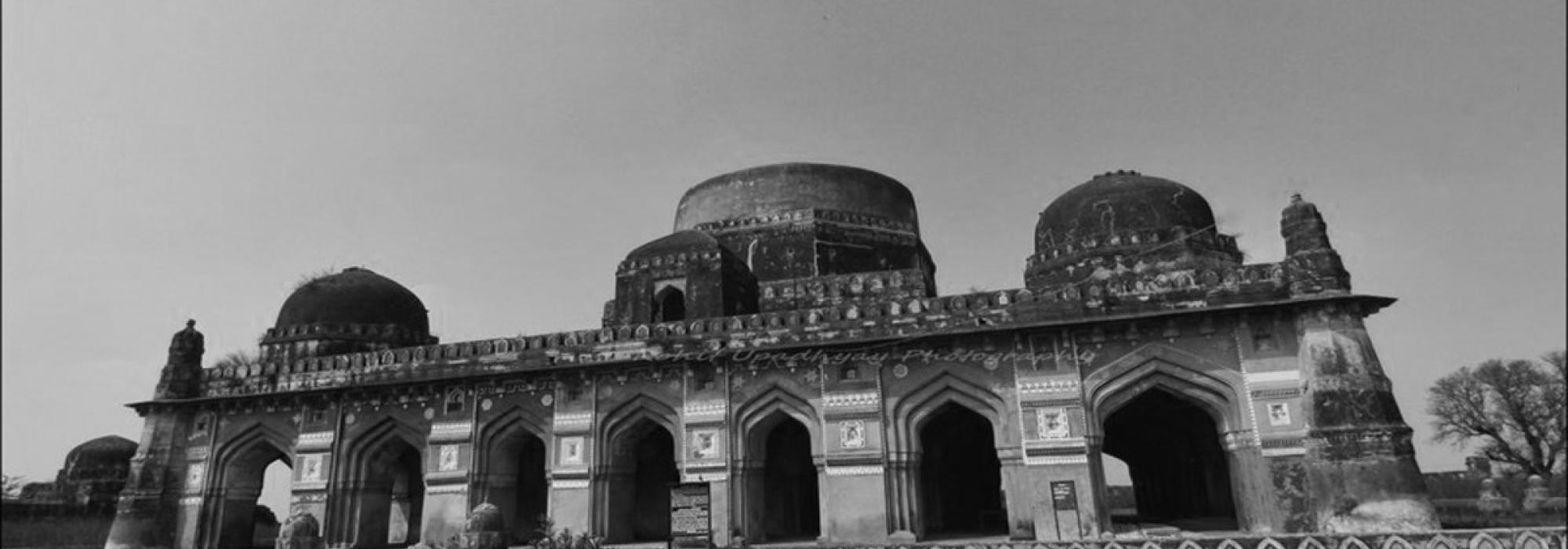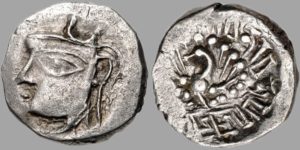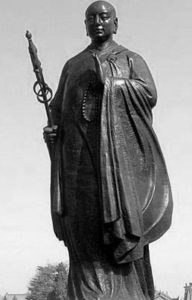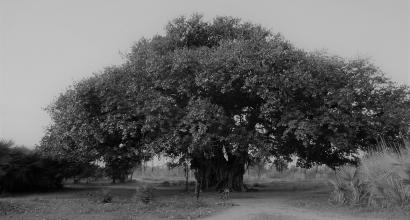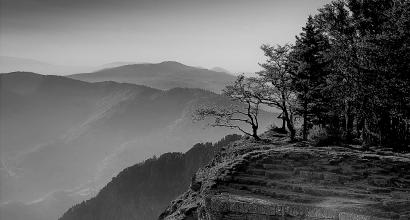In the later part of the Gupta Era, we see the rise of Sthaneshwar, which is on the banks of the Ganga. It lies between Ambala and Delhi, near Kurukshetra. A great king who came from there was Harshavardhana. Like the Guptas, he too came from a family of vaiśyas. Harshavardhana’s father was Prabhakaravardhana and his brother was Rajyavardhana. Even when they were in quite a formidable position, their kingdom had threats; they faced pressure from various sides. One thing is true: every kingdom will have opposition from its own people. No country, no people, no religion or sect is an exception to this, although there might be variations in degree. In such circumstances, even as a fourteen-year-old boy, Harshavardhana had to face the harsh realities of life. His sister Rajyashree was married to King Grihavarma of Kanyakubja (Kannauj), who was killed by the king of Malwa. She was thus widowed, and imprisoned. Harshavardhana’s father died; unable to bear the loss of his father, his brother Rajyavardhana died. His mother Yashomati performed sahagamana and died with her husband – in this manner, when faced with danger from every direction, Harshavardhana stood firm and braved the onslaught of reality. On the one side, he had to battle King Shashanka from Gauḍadeśa; on the other side he had to fight with the Pratyanta-dasyus (the attacks from the Western frontiers and the coastline). Apart from these external wars, he had to reduce the infighting within his kingdom. And he also had to find his widowed sister who was being held captive. Harshavardhana managed to achieve all this, including the rescue of his sister. Since she didn’t have any children, her kingdom came to him. What is remarkable is that amidst all this, he retained his interest in learning the philosophies of the various schools and sects; he was a find connoisseur of literature, dance, music, drama, and other art forms. Thus he tried to create an atmosphere of joy and peace for his subjects.
In spite of doing all this, there were a few disasters that took place. Harshavardhana also had many a weakness. We shall take a look at those as well. We must study the strengths and weaknesses of a person objectively and without hesitation or emotional colouring. It is not sufficient merely to pat our backs; we must be ready to whip it too. We find that any empire that does not balance brāhma and kṣātra dynamically, however strong or virtuous the king might be, will weaken after the death of the emperor. Three examples will suffice to illustrate this: Ashoka, Kanishka, and Harshavardhana. We see in all three cases that the emperors were unable to identify the right successors and—although they personally became high points in their dynasties—those empires declined. The pinnacle of the reign of the Kushanas was during the reign of Kanishka and the decline of the empire was also during the time of his death. Indeed, there was Huvishka and others but there were no comparison to Kanishka. After Ashoka came Dasharatha, Brihadratha, Sampratichandragupta, and others, but they all sat on unstable thrones and for short periods. Take the case of Bahadur Shah Zafar; he too existed. What is the meaning in hailing him as the last king of the Mughals? In the south, how strong the Marathas were! In the north, how powerful the Sikhs were! Bahadur Shah Zafar was never to this level. This being the case, is it possible to call his reign as the ‘pinnacle of the Mughal Empire’? At the same time, we can’t say that they were all spineless and incompetent. Zafar’s predecessor Aurangzeb was strong; he was competent in deceit and strategy. Ashoka too was extremely competent. As for Harshavardhana, it is needless to say. But what do we see in history? In the latter half of Aurangzeb’s life, the expansive Mughal Empire began declining. That was a result of his bigotry and cruelty. To put it lightly, he was cruel, treacherous, and malicious. But Ashoka, Kanishka, and Harshavardhana were compassionate, open-minded in their views towards all sects, and loved their subjects greatly. In this calculation, the aspects of their cruelty or compassion doesn’t count. An inordinate obsession with sectarian views is always a path to ruin. Kṣātra needs a certain balance, control – ‘nāti krūraḥ Nāti mṛduḥ,’ neither too harsh nor too soft; the response should be appropriate to the situation and it cannot be based on a changeless dictum or formula. Bāṇabhaṭṭa in his Harṣacarita has described the life of his emperor in exquisite poetry. We find both extraordinary poetry and remarkable life values in Bāṇa’s masterpiece. Harshavardhana was a great patron of poets and scholars as well as seeker-travellers from other lands including Yijing (I Tsing) and Xuanzang (Hsuan-tsang). He gave away a lot in charity. His generosity was of such a great kind that once in every five years he would go to Prayaga and donate all the money in his treasury. Once he gave away everything and in the end he had to beg his sister for a piece of cloth to cover himself. A man who had such detachment, such generosity put his kingdom in such a position that it went to the dogs after his time – why did he do so? Perhaps it was an inappropriate exhibition of his magnanimity and undue emphasis on peace and compassion.
Prejudice of the Foreign Travellers
The Chinese traveller Xuanzang, who received great support from King Harshavardhana, has written highly about the king in his travelogue. In these travellers, the intensity of the faith in Buddhism is so much that their writings suggest that a non-Buddhist world did not exist in India! These Buddhist travellers no less than others in their religious bigotry. As for Xuanzang, at every step he denigrates Sanātana-dharma; he rebukes the brāhmaṇas, the śaivas, and the vaiṣṇavas; he says that Kāśi is full of atheists. Since the adherents of Sanātana-dharma call Jains and Buddhists as atheists (the actual word is nāstika, which means ‘one who doesn’t believe in existence of the Supreme’ or ‘one who doesn’t value the authority of the Vedas’), they took call Hindus as atheists. Harshavardhana invited Xuanzang to a great vākyārthagoṣṭhi (debate on some topic of philosophy or language, etc.), honoured him, and gave him the opportunity to present his arguments. About that episode, Xuanzang writes: “The king did not let anyone speak in my presence!” With such an attitude, how can any discussion proceed? He came all the way from China and studied at university of Nalanda. But is it possible that he could surpass those scholars who were born and grew up on this soil? However hard we may try and learn French or German or Greek, is it so simple or straightforward to excel the scholars of those languages who are born and raised in those countries? And particularly in that age when scholarship was at its peak, is Xuanzang’s claim tenable? The Chinese travellers are known primary for their translation work, which is no doubt commendable. However, none of them has written a valuable treatise in Sanskrit or Pali either about Buddhism or about grammar or other śāstras; they are not known for scholarly work. They were content with translations and couldn’t contribute anything to the tradition. The writings of these Chinese travellers are filled with prejudice. In other matters, however thorough and sensitive their examinations might be, when it comes to matters of faith and self-aggrandizement, their weakness is exposed. Any traveller can make exaggerated claims in his travelogue. Who is to stop him? This applies to Chinese travellers too. They came all the way to India with a view to learn and in the process faced a lot of difficulties. And after having faced so much of trouble and overcome them, will they not expect something in return? And what was the reward they got? State honours in their home country along with awards from scholarly assemblies and the praise of the common people. While their work is commendable, perhaps with an eye on such rewards, they might have boosted up certain episodes in their travelogues. Several historians have pointed out that there are blatant lies in many of these travelogues. There is a lot of information about this. Dr. H L Nagegowda has methodically collected all the writings of these travellers in a multi-volume work titled ‘Pravāsi Kaṇḍa Iṇḍiyā’ (in Kannada). He has given a lot of footnotes giving the actual events of that time (as opposed to the lies they have uttered in their accounts). Of course, these are based on earlier works written in English about these subjects. For that many, any learned reader will not be unable to spot the errors and lies in these travelogues. When we look at some of the travellers who came to India from China and other places, stayed here, became Buddhists, studied Buddhism and translated Buddhist texts and compare them with the later European Christian scholars who came to India, learnt Sanskrit, and conducted research, we find that in some aspects the Buddhist travellers are far more honest and free from malice. All of them had devotion and respect towards India; they revered the people and culture of India. But in general the European Christian scholars did not have such a mindset. The main reasons for this include their political supremacy, superiority in science and technology, and their religious bias. They always looked at Indian culture and scholarship with disgust, condescension, or prejudice, but never with respect. And even today – several years after India has attained independence – it doesn’t seem like the attitude of the Western scholars has changed. None of them have composed any noteworthy works of kāvya or śāstra in Sanskrit or Prakrit (or other Indian languages for that matter). Most of the research is tainted with prejudice and bias. During the Gandhi-Nehru era, due to the obstruction of the balanced progression of brāhma and kṣātra by the ignorant and malevolent academics, it provided an unobstructed path for this sort of ill-informed and biased research by Westerners. Indeed, we have greatly benefitted from some of the academic methodologies of the Westerners; also, due to a few honest Western scholars, the vision of the truth has been established. But for a few such benefits, we have had to pay a huge price; we have had to undergo so much of pain and destruction. The benefits that we gained from this are only those that are free from the taint of Western religion – in the areas of science and technology. As for the political and religious aspects, it has only been ruinous to say the least. And in the barbaric attack of Islam on India, all these pains and troubles were multiplied a hundred times. Xuanzang doesn’t stop here. He was a Mahayana Buddhist. Therefore he rebukes the Hinayana Buddhists with the choicest of words; he claims that he has ‘defeated them all in debates.’ Even in our tradition, if one looks at Yatirājavijaya or Śaṅkaravijaya or Madhvavijaya, it’s quite the same. It says that all the scholars of that age lost in all debates to their ācārya. And not just that, they make a list of people who lived five hundred years earlier and a thousand years later, saying that all of them lost to their ācārya in debate! Weren’t there scholars in their era who were capable of defeating them in debate? Perhaps there were. But they speak of those scholars as insignificant. Therefore such works can at best be called sectarian and not historical. To be continued. Translated by Sandeep Balakrishna and Hari Ravikumar from the original Kannada.

